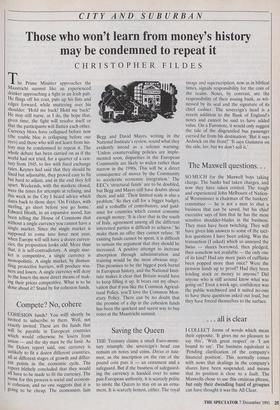CITY AND SUBURBAN
Those who won't learn from money's history may be condemned to repeat it
CHRISTOPHER FILDES
The Prime Minister approaches the Maastricht summit like an experienced drinker approaching a fight in an Irish pub. He flings off his coat, puts up his fists and edges forward, while muttering over his shoulder: `Hold me back! Hold me back!' He may.still nurse, as I do, the hope that, given time, the fight will resolve itself or that the participants will flatten each other. Currency blocs have collapsed before now (the rouble bloc is collapsing before our eyes) and those who will not learn from his- tory may be condemned to repeat it. The whole debate has been carried on as if the world had not tried, for a quarter of a cen- tury from 1945, to live with fixed exchange rates. Keynes had said that they should be fixed but adjustable, they proved easy to fix but hard to adjust, and in the end they fell apart. Weekends, with the markets closed, were the times for attempts at refixing, and this week in the City I heard advice which dates back to those days: 'On Fridays, with sterling, go short before you go home.' Edward Heath, in an expansive mood, has been telling the House of Commons that without a single currency you cannot have a single market. Since the single market is supposed to come into force next year, when Europe will still have a dozen curren- cies, the proposition looks odd. More than that, it is self-contradictory. A single mar- ket is competitive, a single currency is monopolistic. A single market, by disman- tling protective barriers, will produce win- ners and losers. A single currency will deny to the losers the most direct means of mak- ing their prices competitive. What is to be done about it? Stand by for cohesion funds.


























































 Previous page
Previous page